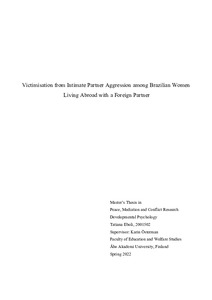Victimisation from Intimate Partner Aggression among Brazilian Women Living Abroad with a Foreign Partner
Eboli, Tatiana (2022)
Eboli, Tatiana
2022
All rights reserved. This publication is copyrighted. You may download, display and print it for Your own personal use. Commercial use is prohibited.
Julkaisun pysyvä osoite on
https://urn.fi/URN:NBN:fi-fe2022060845056
https://urn.fi/URN:NBN:fi-fe2022060845056
Tiivistelmä
Objective: The study aimed to investigate victimisation from intimate partner aggression, support received, and psychological characteristics of Brazilian women living abroad with a foreign partner.
Method: Brazilian women living abroad who were victims of intimate partner aggression perpetrated by a non-Brazilian partner were interviewed online. The women took part in three different associations formed by Brazilian women offering help to victims of domestic violence. One is a community-based organisation, one is a social enterprise, and one is a collaborative platform.
Results: The assistance the majority of the victims had sought in the country of residence during the abusive relationship was not effective. A number of women relived the trauma of the abuse while receiving support from governmental and non-governmental institutions. Narratives of feelings of guilt, rage, shame, and suicidal ideation are presented. Most of the women who had children with their abusers could not return to Brazil and, thus, experienced that they were stripped of their human rights. Seven additional themes emerged from the interviews: psychological, physical, economic, moral and sexual abuse, abuse witnessed and/or suffered by the children and manipulation by the aggressor after the separation, which constitutes stalking practice.
Conclusions: Brazilian women living abroad with a foreign partner were victims of intimate partner abuse. Additionally, they were revictimised by the system that removed their autonomy. There is a scarcity of studies on the topic of victimisation of Brazilian women living abroad with a foreign partner.
Method: Brazilian women living abroad who were victims of intimate partner aggression perpetrated by a non-Brazilian partner were interviewed online. The women took part in three different associations formed by Brazilian women offering help to victims of domestic violence. One is a community-based organisation, one is a social enterprise, and one is a collaborative platform.
Results: The assistance the majority of the victims had sought in the country of residence during the abusive relationship was not effective. A number of women relived the trauma of the abuse while receiving support from governmental and non-governmental institutions. Narratives of feelings of guilt, rage, shame, and suicidal ideation are presented. Most of the women who had children with their abusers could not return to Brazil and, thus, experienced that they were stripped of their human rights. Seven additional themes emerged from the interviews: psychological, physical, economic, moral and sexual abuse, abuse witnessed and/or suffered by the children and manipulation by the aggressor after the separation, which constitutes stalking practice.
Conclusions: Brazilian women living abroad with a foreign partner were victims of intimate partner abuse. Additionally, they were revictimised by the system that removed their autonomy. There is a scarcity of studies on the topic of victimisation of Brazilian women living abroad with a foreign partner.
Kokoelmat
- 515 Psykologia [235]
